DM 142 Principles of Management: Managerial Planning and Goal Setting
VerifiedAdded on 2021/08/06
|61
|4517
|277
Report
AI Summary
This report, prepared for the Principles of Management course (DM 142) at the University of Colombo, delves into the critical aspects of managerial planning and goal setting. It begins by defining planning as a fundamental managerial activity and explores its characteristics and importance, including its role in providing direction, reducing uncertainty, and establishing control. The report then outlines the planning process, from the mission and vision of an organization to the setting of goals and objectives, emphasizing the SMART criteria. It further distinguishes between strategic, tactical, and operational planning levels and discusses various types of planning, including Management by Objectives (MBO), standing plans, and single-use plans. The document also covers the principles of effective planning, such as setting clear aims, developing accurate forecasts, and involving subordinates in the process. Throughout the report, practical examples are provided, making it a valuable resource for students studying management and organizational studies.
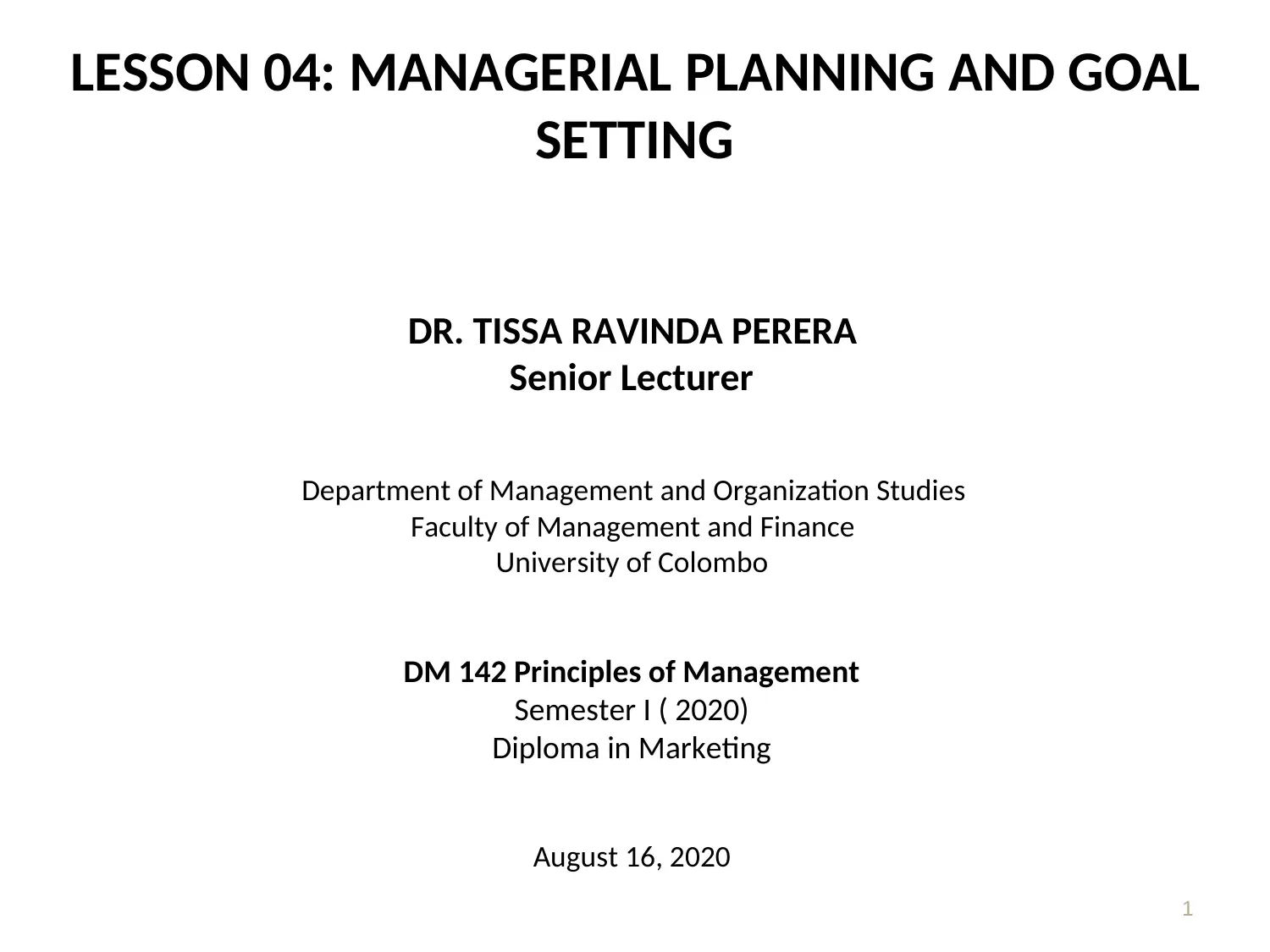
LESSON 04: MANAGERIAL PLANNING AND GOAL
SETTING
DR. TISSA RAVINDA PERERA
Senior Lecturer
Department of Management and Organization Studies
Faculty of Management and Finance
University of Colombo
DM 142 Principles of Management
Semester I ( 2020)
Diploma in Marketing
August 16, 2020
1
SETTING
DR. TISSA RAVINDA PERERA
Senior Lecturer
Department of Management and Organization Studies
Faculty of Management and Finance
University of Colombo
DM 142 Principles of Management
Semester I ( 2020)
Diploma in Marketing
August 16, 2020
1
Paraphrase This Document
Need a fresh take? Get an instant paraphrase of this document with our AI Paraphraser
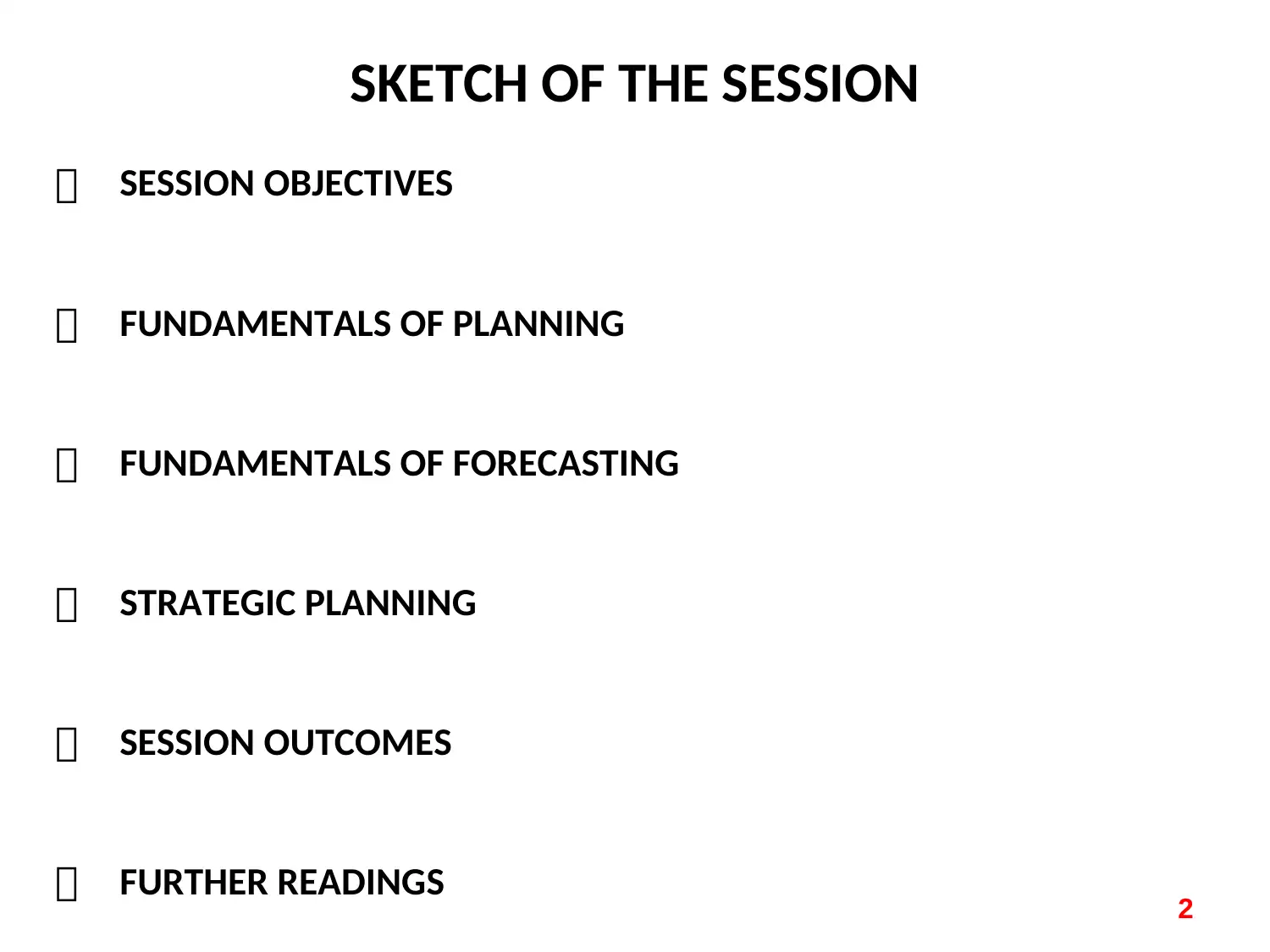
SKETCH OF THE SESSION
SESSION OBJECTIVES
FUNDAMENTALS OF PLANNING
FUNDAMENTALS OF FORECASTING
STRATEGIC PLANNING
SESSION OUTCOMES
FURTHER READINGS 2
SESSION OBJECTIVES
FUNDAMENTALS OF PLANNING
FUNDAMENTALS OF FORECASTING
STRATEGIC PLANNING
SESSION OUTCOMES
FURTHER READINGS 2
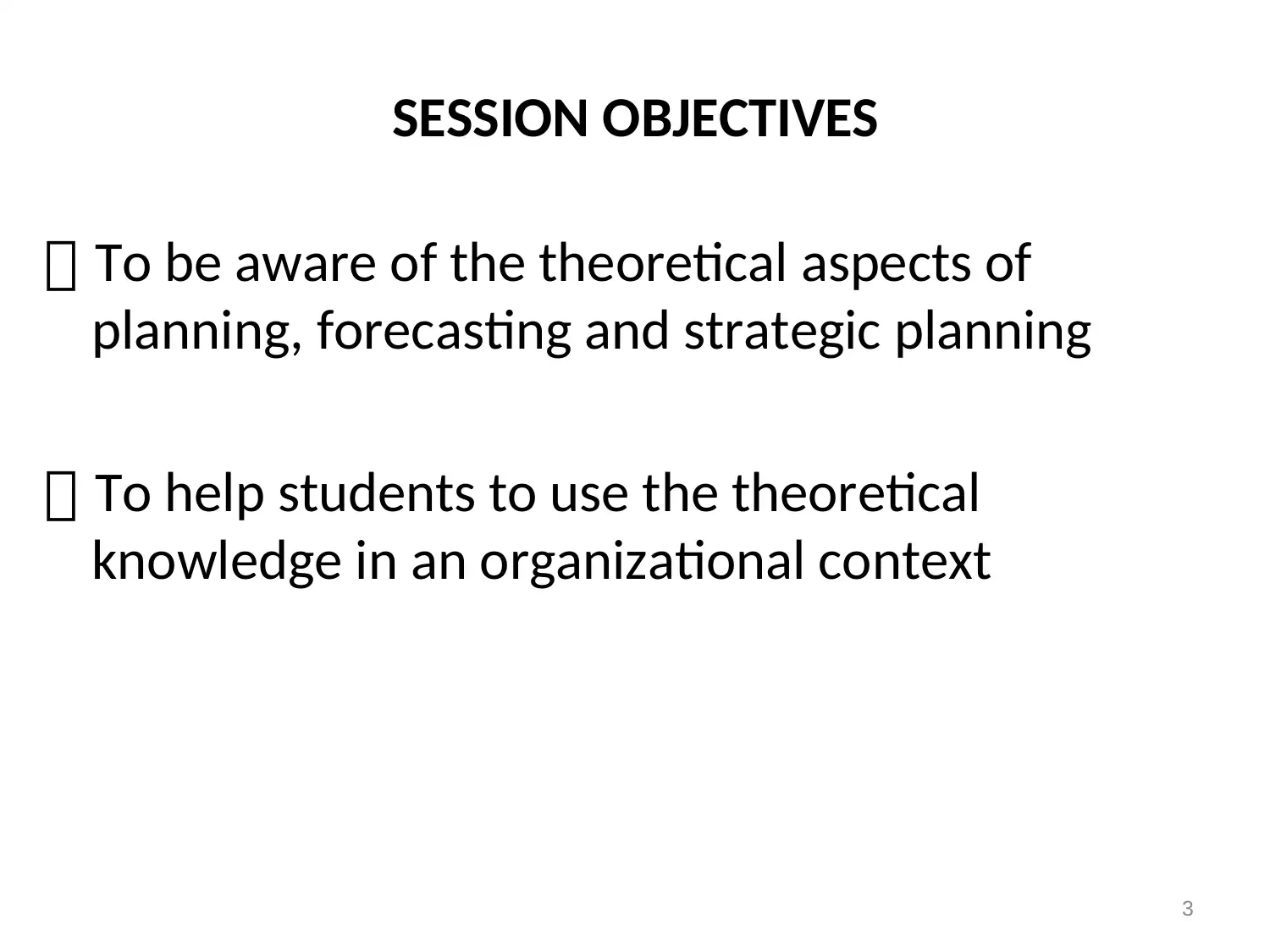
SESSION OBJECTIVES
To be aware of the theoretical aspects of
planning, forecasting and strategic planning
To help students to use the theoretical
knowledge in an organizational context
3
To be aware of the theoretical aspects of
planning, forecasting and strategic planning
To help students to use the theoretical
knowledge in an organizational context
3
⊘ This is a preview!⊘
Do you want full access?
Subscribe today to unlock all pages.

Trusted by 1+ million students worldwide
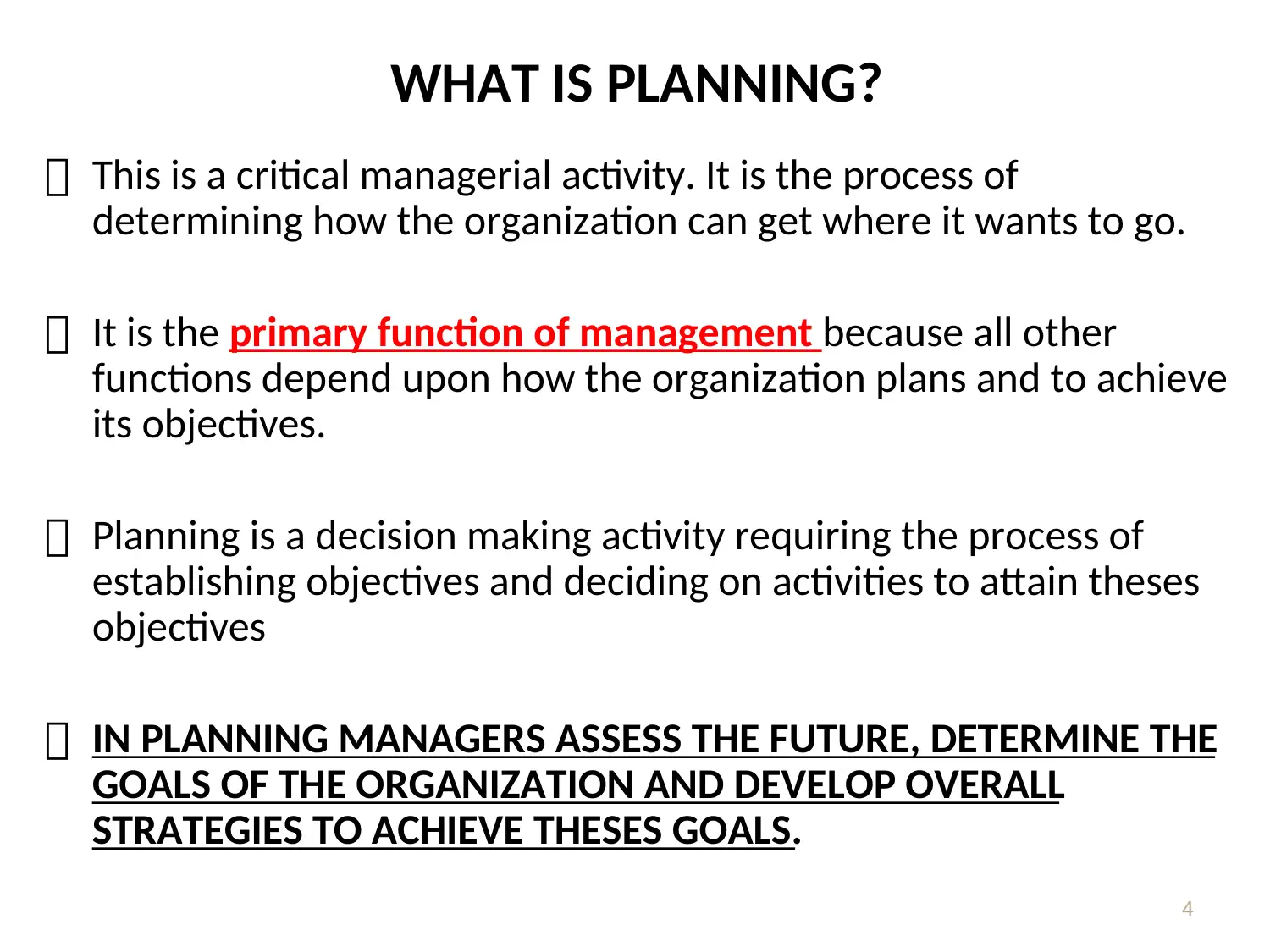
WHAT IS PLANNING?
This is a critical managerial activity. It is the process of
determining how the organization can get where it wants to go.
It is the primary function of management because all other
functions depend upon how the organization plans and to achieve
its objectives.
Planning is a decision making activity requiring the process of
establishing objectives and deciding on activities to attain theses
objectives
IN PLANNING MANAGERS ASSESS THE FUTURE, DETERMINE THE
GOALS OF THE ORGANIZATION AND DEVELOP OVERALL
STRATEGIES TO ACHIEVE THESES GOALS.
4
This is a critical managerial activity. It is the process of
determining how the organization can get where it wants to go.
It is the primary function of management because all other
functions depend upon how the organization plans and to achieve
its objectives.
Planning is a decision making activity requiring the process of
establishing objectives and deciding on activities to attain theses
objectives
IN PLANNING MANAGERS ASSESS THE FUTURE, DETERMINE THE
GOALS OF THE ORGANIZATION AND DEVELOP OVERALL
STRATEGIES TO ACHIEVE THESES GOALS.
4
Paraphrase This Document
Need a fresh take? Get an instant paraphrase of this document with our AI Paraphraser
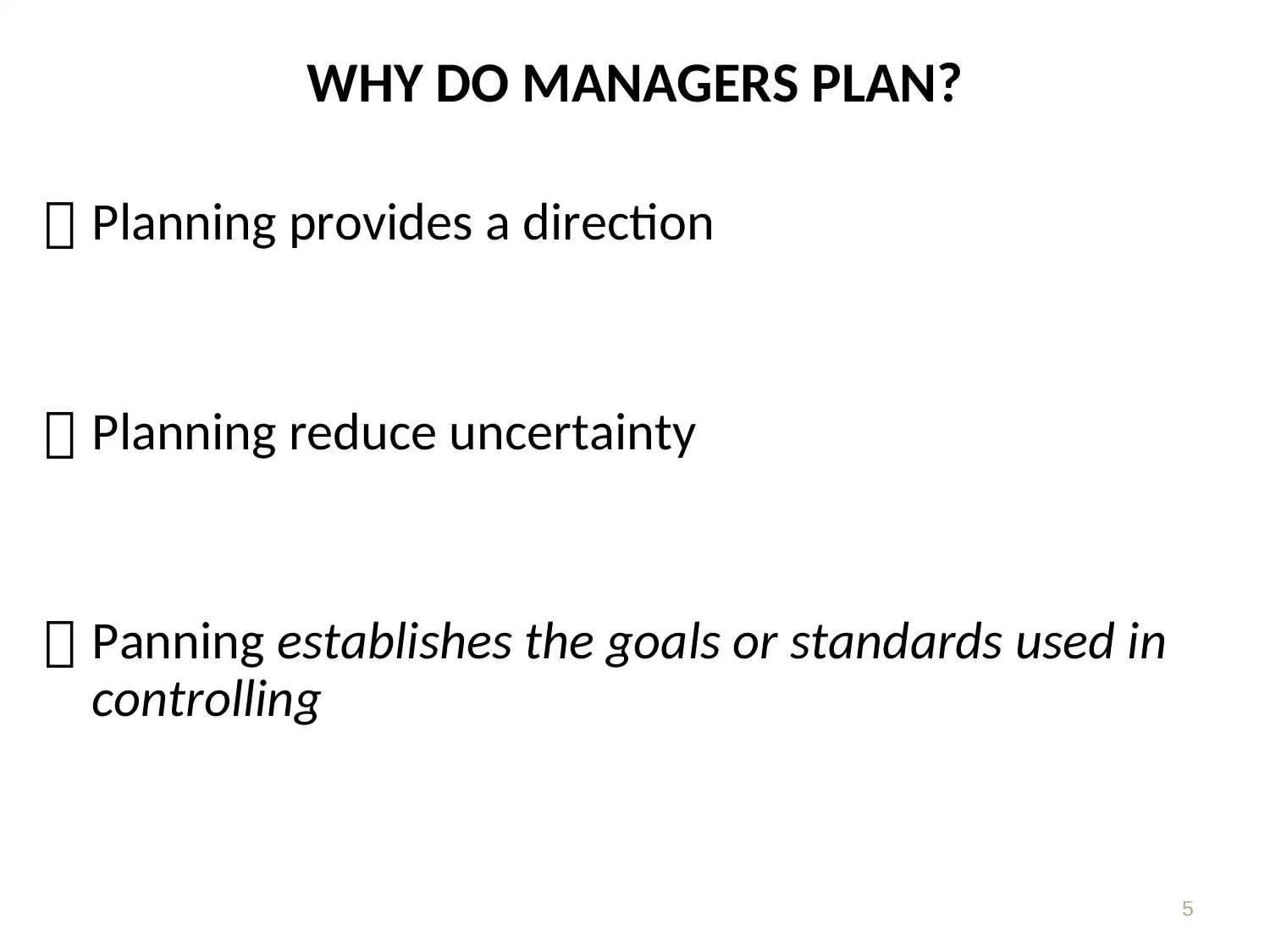
WHY DO MANAGERS PLAN?
Planning provides a direction
Planning reduce uncertainty
Panning establishes the goals or standards used in
controlling
5
Planning provides a direction
Planning reduce uncertainty
Panning establishes the goals or standards used in
controlling
5
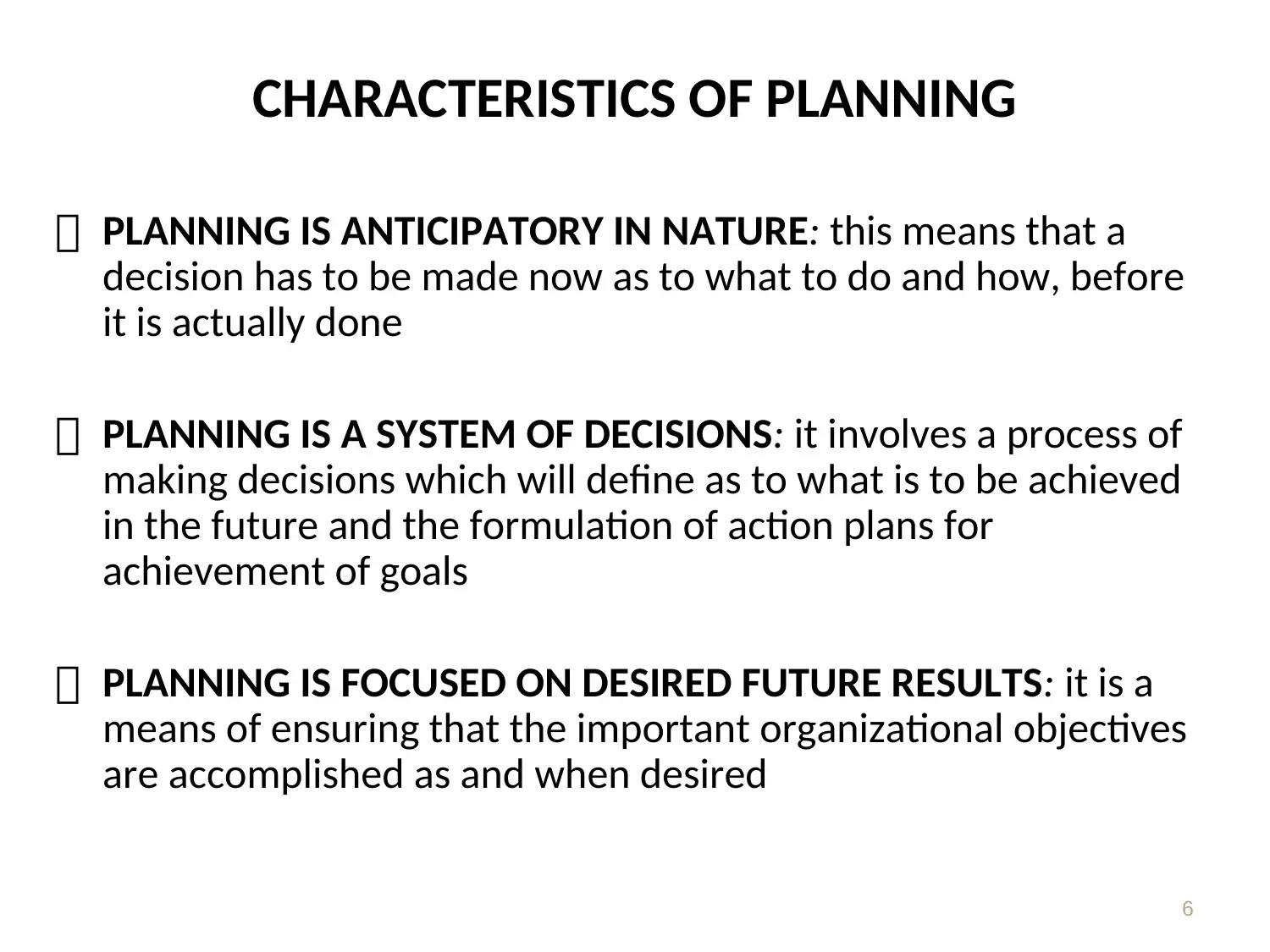
CHARACTERISTICS OF PLANNING
PLANNING IS ANTICIPATORY IN NATURE: this means that a
decision has to be made now as to what to do and how, before
it is actually done
PLANNING IS A SYSTEM OF DECISIONS: it involves a process of
making decisions which will define as to what is to be achieved
in the future and the formulation of action plans for
achievement of goals
PLANNING IS FOCUSED ON DESIRED FUTURE RESULTS: it is a
means of ensuring that the important organizational objectives
are accomplished as and when desired
6
PLANNING IS ANTICIPATORY IN NATURE: this means that a
decision has to be made now as to what to do and how, before
it is actually done
PLANNING IS A SYSTEM OF DECISIONS: it involves a process of
making decisions which will define as to what is to be achieved
in the future and the formulation of action plans for
achievement of goals
PLANNING IS FOCUSED ON DESIRED FUTURE RESULTS: it is a
means of ensuring that the important organizational objectives
are accomplished as and when desired
6
⊘ This is a preview!⊘
Do you want full access?
Subscribe today to unlock all pages.

Trusted by 1+ million students worldwide
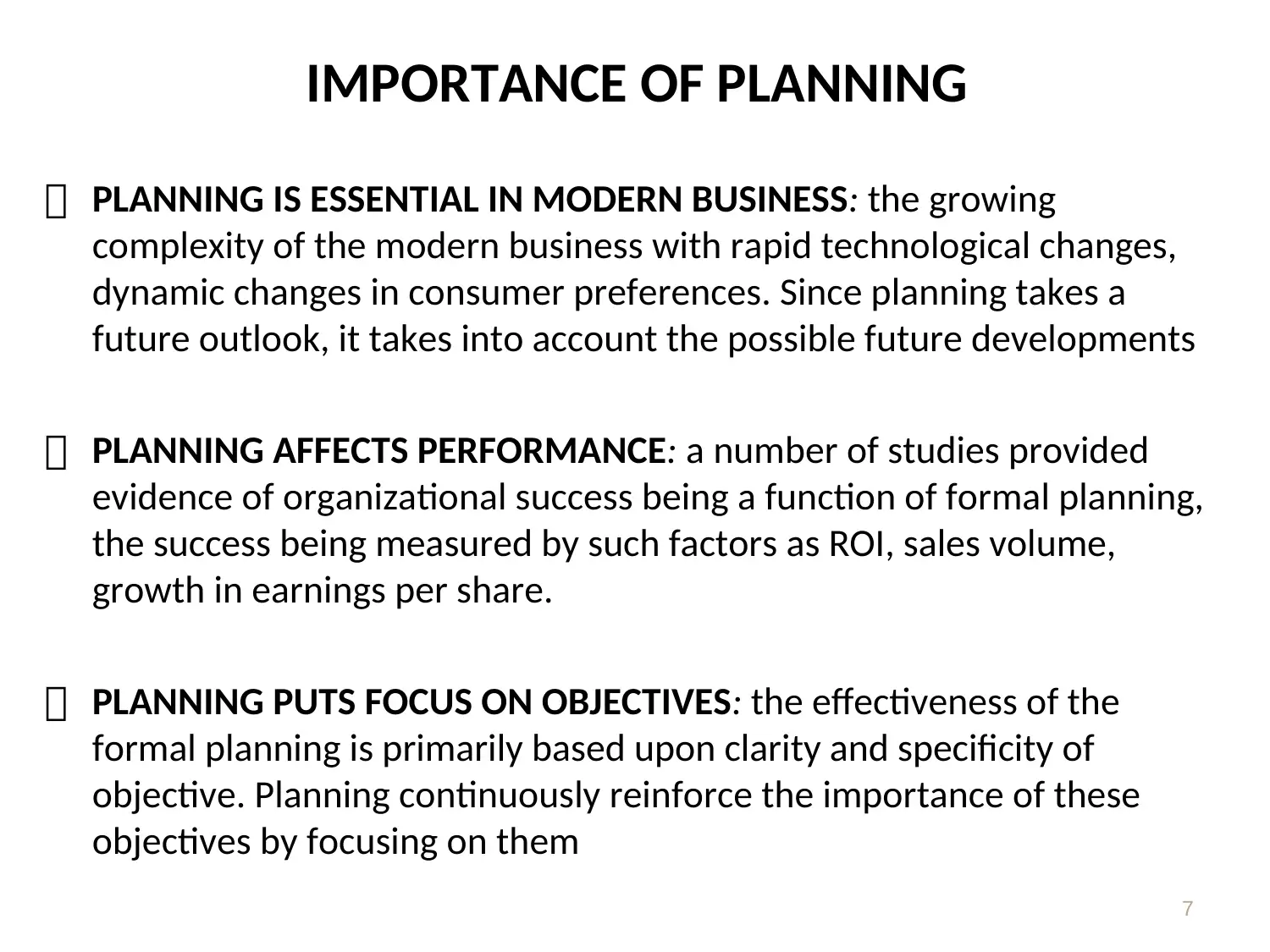
IMPORTANCE OF PLANNING
PLANNING IS ESSENTIAL IN MODERN BUSINESS: the growing
complexity of the modern business with rapid technological changes,
dynamic changes in consumer preferences. Since planning takes a
future outlook, it takes into account the possible future developments
PLANNING AFFECTS PERFORMANCE: a number of studies provided
evidence of organizational success being a function of formal planning,
the success being measured by such factors as ROI, sales volume,
growth in earnings per share.
PLANNING PUTS FOCUS ON OBJECTIVES: the effectiveness of the
formal planning is primarily based upon clarity and specificity of
objective. Planning continuously reinforce the importance of these
objectives by focusing on them
7
PLANNING IS ESSENTIAL IN MODERN BUSINESS: the growing
complexity of the modern business with rapid technological changes,
dynamic changes in consumer preferences. Since planning takes a
future outlook, it takes into account the possible future developments
PLANNING AFFECTS PERFORMANCE: a number of studies provided
evidence of organizational success being a function of formal planning,
the success being measured by such factors as ROI, sales volume,
growth in earnings per share.
PLANNING PUTS FOCUS ON OBJECTIVES: the effectiveness of the
formal planning is primarily based upon clarity and specificity of
objective. Planning continuously reinforce the importance of these
objectives by focusing on them
7
Paraphrase This Document
Need a fresh take? Get an instant paraphrase of this document with our AI Paraphraser
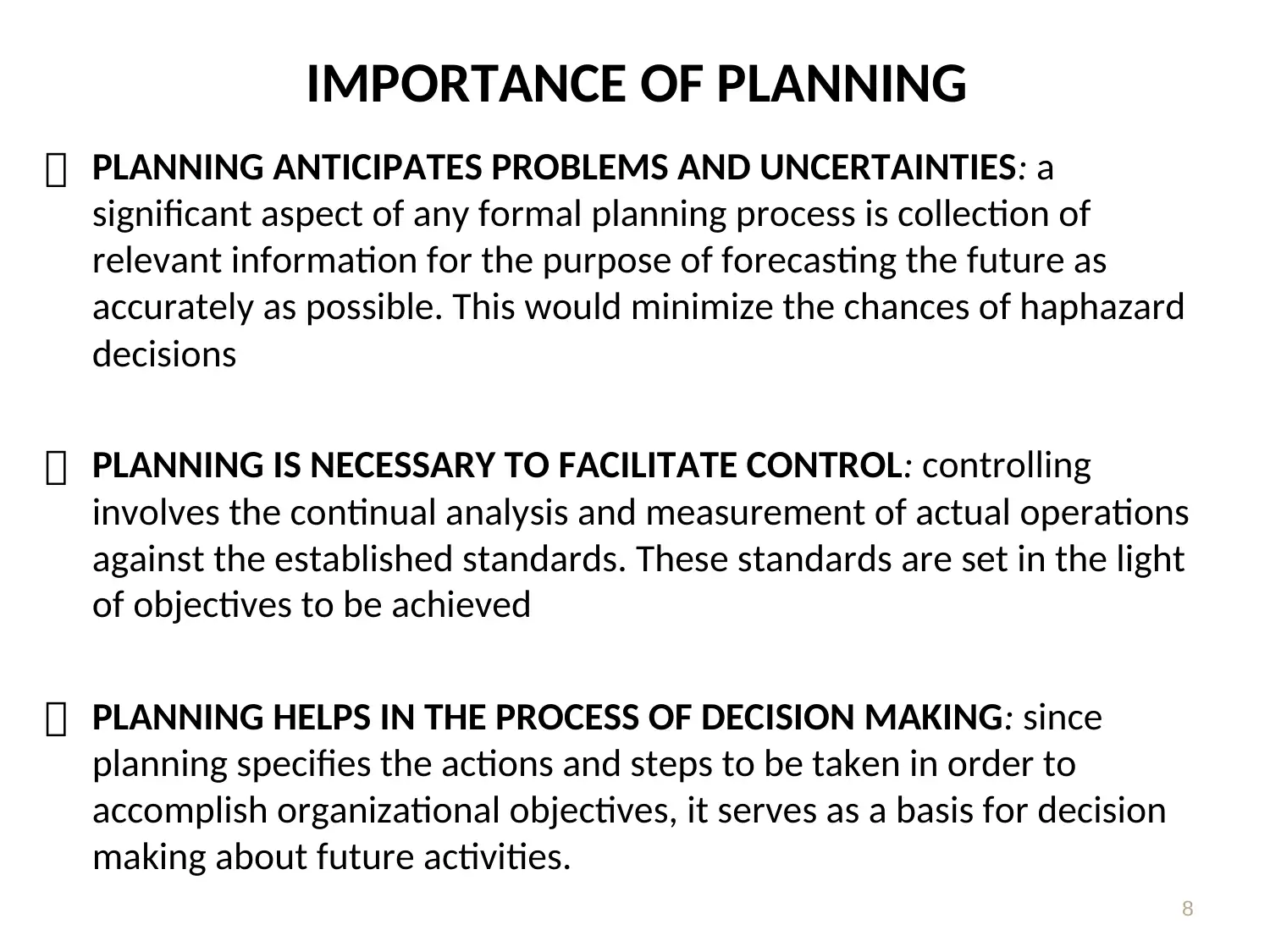
IMPORTANCE OF PLANNING
PLANNING ANTICIPATES PROBLEMS AND UNCERTAINTIES: a
significant aspect of any formal planning process is collection of
relevant information for the purpose of forecasting the future as
accurately as possible. This would minimize the chances of haphazard
decisions
PLANNING IS NECESSARY TO FACILITATE CONTROL: controlling
involves the continual analysis and measurement of actual operations
against the established standards. These standards are set in the light
of objectives to be achieved
PLANNING HELPS IN THE PROCESS OF DECISION MAKING: since
planning specifies the actions and steps to be taken in order to
accomplish organizational objectives, it serves as a basis for decision
making about future activities.
8
PLANNING ANTICIPATES PROBLEMS AND UNCERTAINTIES: a
significant aspect of any formal planning process is collection of
relevant information for the purpose of forecasting the future as
accurately as possible. This would minimize the chances of haphazard
decisions
PLANNING IS NECESSARY TO FACILITATE CONTROL: controlling
involves the continual analysis and measurement of actual operations
against the established standards. These standards are set in the light
of objectives to be achieved
PLANNING HELPS IN THE PROCESS OF DECISION MAKING: since
planning specifies the actions and steps to be taken in order to
accomplish organizational objectives, it serves as a basis for decision
making about future activities.
8
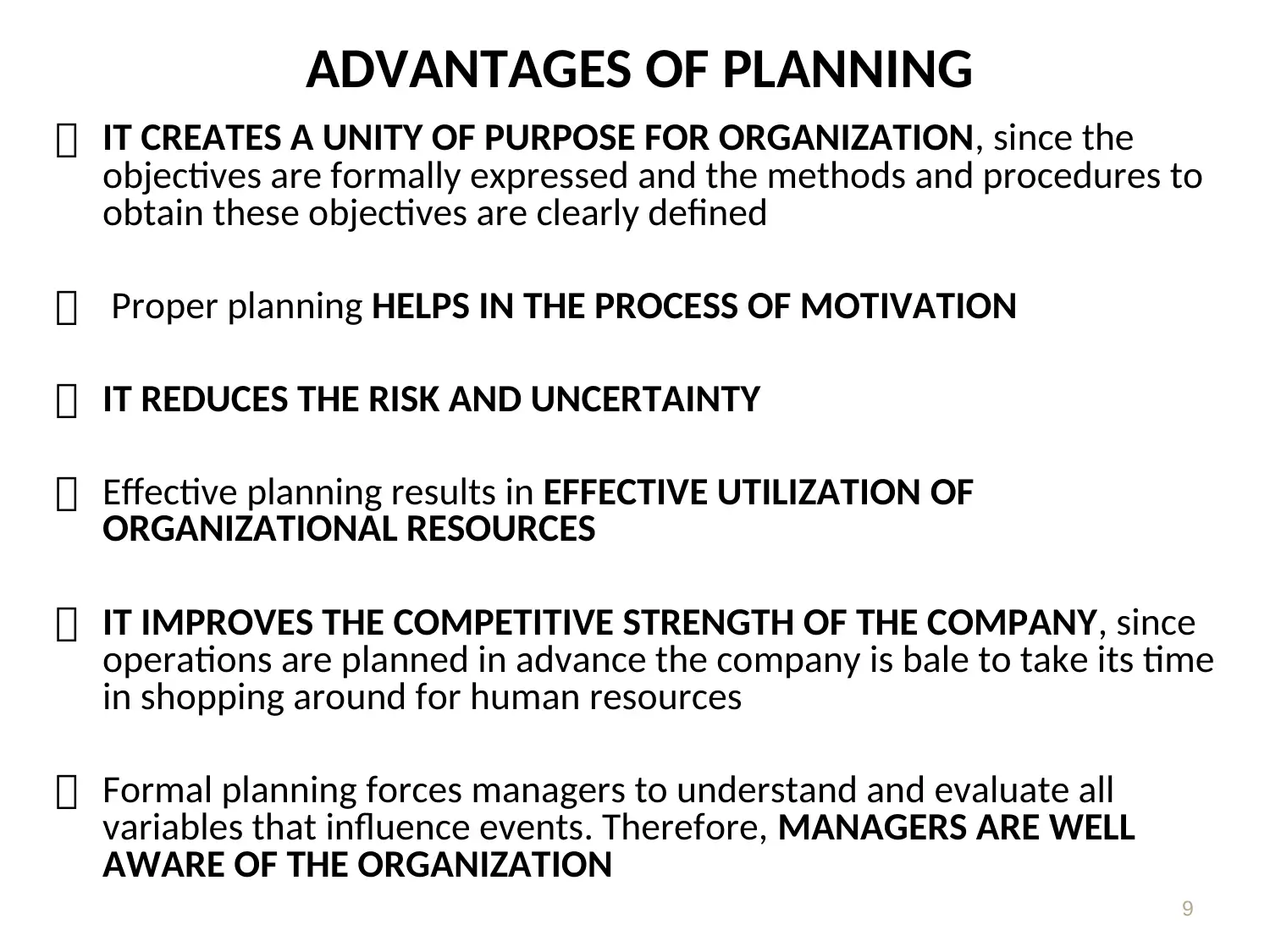
ADVANTAGES OF PLANNING
IT CREATES A UNITY OF PURPOSE FOR ORGANIZATION, since the
objectives are formally expressed and the methods and procedures to
obtain these objectives are clearly defined
Proper planning HELPS IN THE PROCESS OF MOTIVATION
IT REDUCES THE RISK AND UNCERTAINTY
Effective planning results in EFFECTIVE UTILIZATION OF
ORGANIZATIONAL RESOURCES
IT IMPROVES THE COMPETITIVE STRENGTH OF THE COMPANY, since
operations are planned in advance the company is bale to take its time
in shopping around for human resources
Formal planning forces managers to understand and evaluate all
variables that influence events. Therefore, MANAGERS ARE WELL
AWARE OF THE ORGANIZATION
9
IT CREATES A UNITY OF PURPOSE FOR ORGANIZATION, since the
objectives are formally expressed and the methods and procedures to
obtain these objectives are clearly defined
Proper planning HELPS IN THE PROCESS OF MOTIVATION
IT REDUCES THE RISK AND UNCERTAINTY
Effective planning results in EFFECTIVE UTILIZATION OF
ORGANIZATIONAL RESOURCES
IT IMPROVES THE COMPETITIVE STRENGTH OF THE COMPANY, since
operations are planned in advance the company is bale to take its time
in shopping around for human resources
Formal planning forces managers to understand and evaluate all
variables that influence events. Therefore, MANAGERS ARE WELL
AWARE OF THE ORGANIZATION
9
⊘ This is a preview!⊘
Do you want full access?
Subscribe today to unlock all pages.

Trusted by 1+ million students worldwide
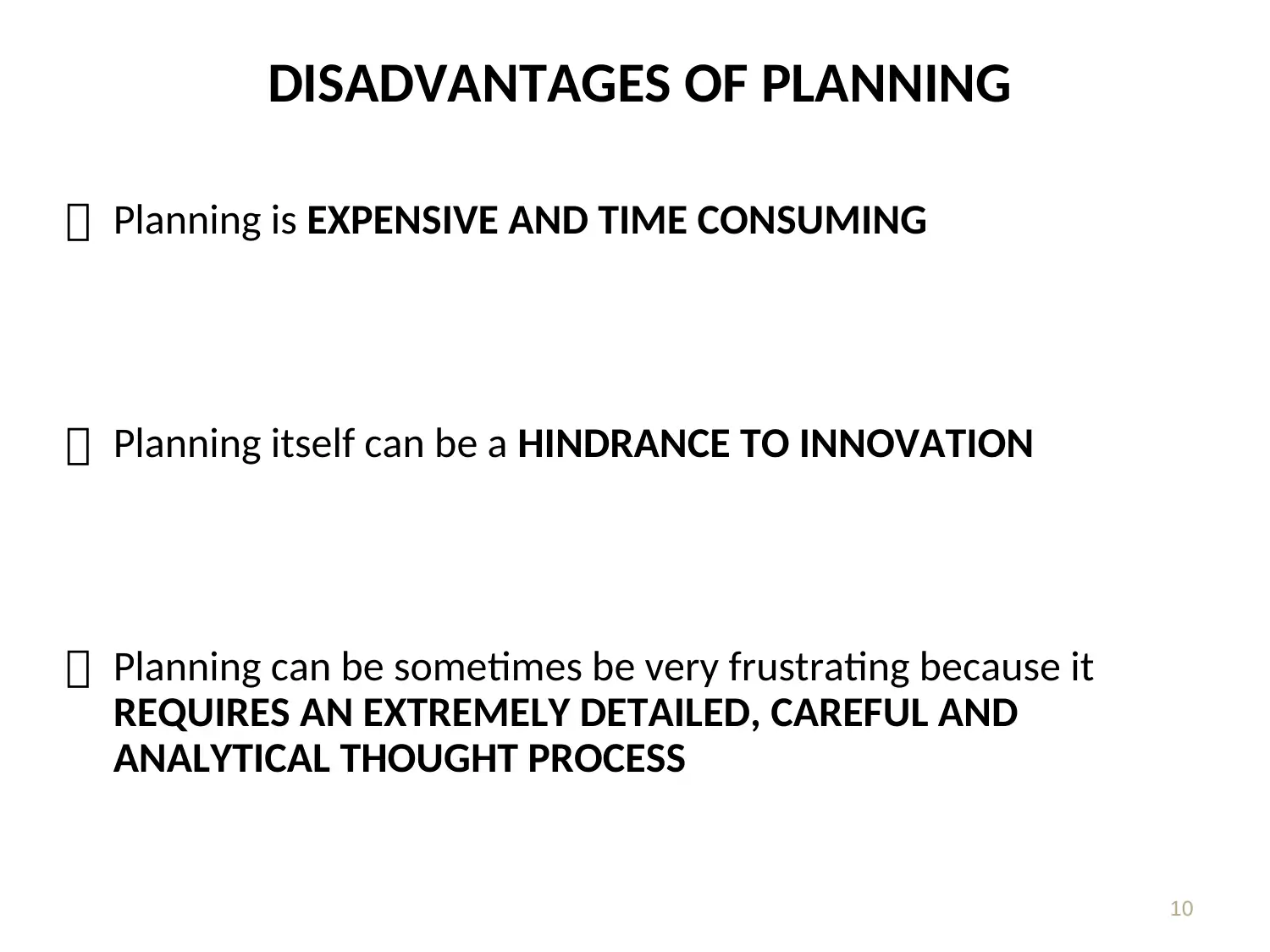
DISADVANTAGES OF PLANNING
Planning is EXPENSIVE AND TIME CONSUMING
Planning itself can be a HINDRANCE TO INNOVATION
Planning can be sometimes be very frustrating because it
REQUIRES AN EXTREMELY DETAILED, CAREFUL AND
ANALYTICAL THOUGHT PROCESS
10
Planning is EXPENSIVE AND TIME CONSUMING
Planning itself can be a HINDRANCE TO INNOVATION
Planning can be sometimes be very frustrating because it
REQUIRES AN EXTREMELY DETAILED, CAREFUL AND
ANALYTICAL THOUGHT PROCESS
10
Paraphrase This Document
Need a fresh take? Get an instant paraphrase of this document with our AI Paraphraser
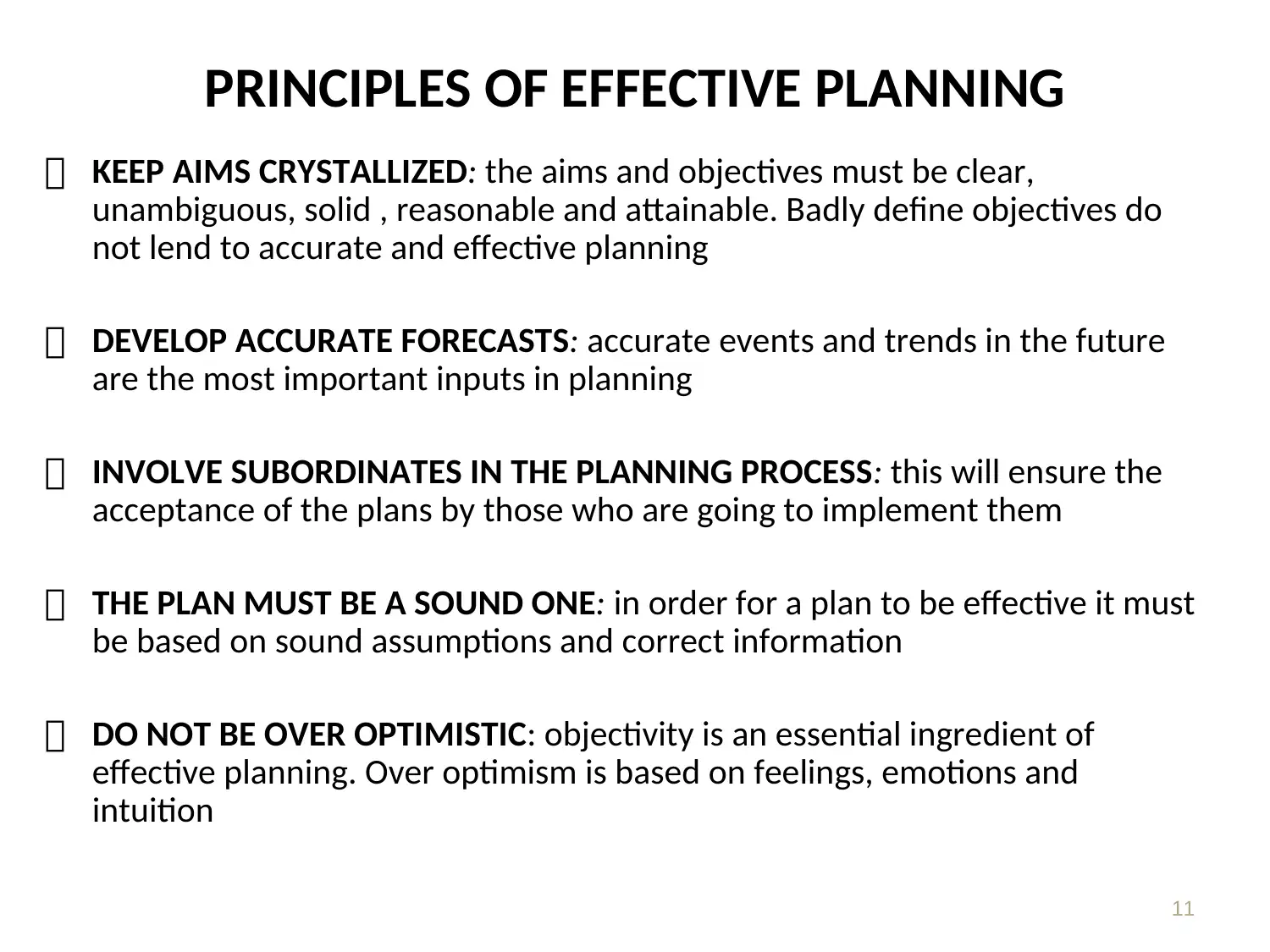
PRINCIPLES OF EFFECTIVE PLANNING
KEEP AIMS CRYSTALLIZED: the aims and objectives must be clear,
unambiguous, solid , reasonable and attainable. Badly define objectives do
not lend to accurate and effective planning
DEVELOP ACCURATE FORECASTS: accurate events and trends in the future
are the most important inputs in planning
INVOLVE SUBORDINATES IN THE PLANNING PROCESS: this will ensure the
acceptance of the plans by those who are going to implement them
THE PLAN MUST BE A SOUND ONE: in order for a plan to be effective it must
be based on sound assumptions and correct information
DO NOT BE OVER OPTIMISTIC: objectivity is an essential ingredient of
effective planning. Over optimism is based on feelings, emotions and
intuition
11
KEEP AIMS CRYSTALLIZED: the aims and objectives must be clear,
unambiguous, solid , reasonable and attainable. Badly define objectives do
not lend to accurate and effective planning
DEVELOP ACCURATE FORECASTS: accurate events and trends in the future
are the most important inputs in planning
INVOLVE SUBORDINATES IN THE PLANNING PROCESS: this will ensure the
acceptance of the plans by those who are going to implement them
THE PLAN MUST BE A SOUND ONE: in order for a plan to be effective it must
be based on sound assumptions and correct information
DO NOT BE OVER OPTIMISTIC: objectivity is an essential ingredient of
effective planning. Over optimism is based on feelings, emotions and
intuition
11
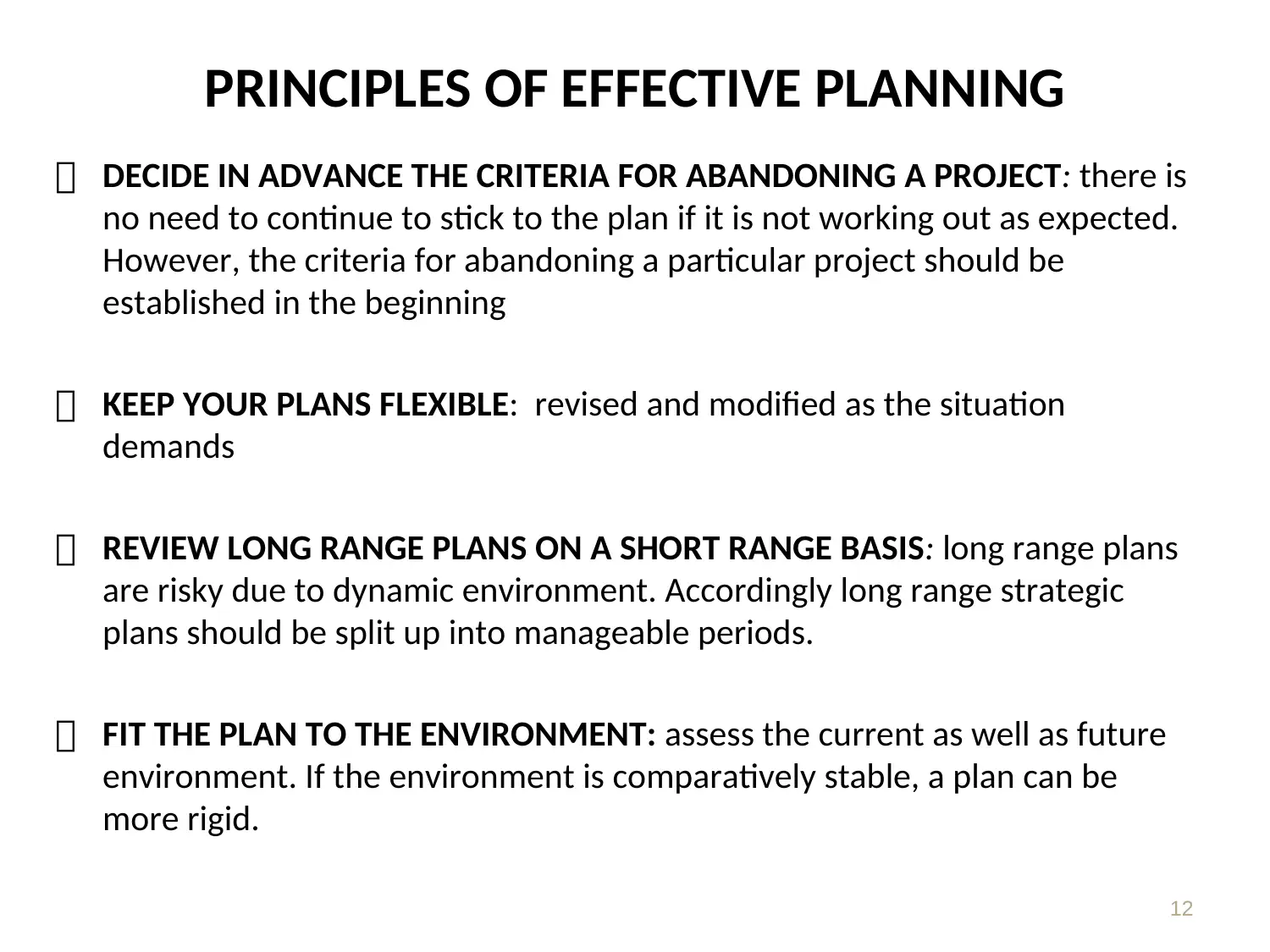
PRINCIPLES OF EFFECTIVE PLANNING
DECIDE IN ADVANCE THE CRITERIA FOR ABANDONING A PROJECT: there is
no need to continue to stick to the plan if it is not working out as expected.
However, the criteria for abandoning a particular project should be
established in the beginning
KEEP YOUR PLANS FLEXIBLE: revised and modified as the situation
demands
REVIEW LONG RANGE PLANS ON A SHORT RANGE BASIS: long range plans
are risky due to dynamic environment. Accordingly long range strategic
plans should be split up into manageable periods.
FIT THE PLAN TO THE ENVIRONMENT: assess the current as well as future
environment. If the environment is comparatively stable, a plan can be
more rigid.
12
DECIDE IN ADVANCE THE CRITERIA FOR ABANDONING A PROJECT: there is
no need to continue to stick to the plan if it is not working out as expected.
However, the criteria for abandoning a particular project should be
established in the beginning
KEEP YOUR PLANS FLEXIBLE: revised and modified as the situation
demands
REVIEW LONG RANGE PLANS ON A SHORT RANGE BASIS: long range plans
are risky due to dynamic environment. Accordingly long range strategic
plans should be split up into manageable periods.
FIT THE PLAN TO THE ENVIRONMENT: assess the current as well as future
environment. If the environment is comparatively stable, a plan can be
more rigid.
12
⊘ This is a preview!⊘
Do you want full access?
Subscribe today to unlock all pages.

Trusted by 1+ million students worldwide
1 out of 61
Related Documents
Your All-in-One AI-Powered Toolkit for Academic Success.
+13062052269
info@desklib.com
Available 24*7 on WhatsApp / Email
![[object Object]](/_next/static/media/star-bottom.7253800d.svg)
Unlock your academic potential
Copyright © 2020–2026 A2Z Services. All Rights Reserved. Developed and managed by ZUCOL.





